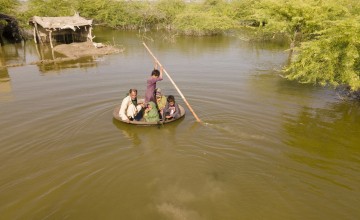
Read our 2023 annual report

Knowledge Hub
COP29 climate finance deal is disgraceful and unacceptable

The failure of world leaders to agree an adequate climate finance deal at COP29 to help some of the poorest countries address the impact of climate change is disgraceful and unacceptable, Concern Worldwide has warned.
“The finance agreement at COP29 means that some of the world’s poorest countries who are currently facing catastrophic impacts of climate change – a crisis they did not create – have been abandoned by wealthier countries and left to solve this crisis themselves,” Concern’s Climate Resilience Advocacy Advisor Laura Bahlman said.
The $300 billion agreed – the New Collective Quantified Goal (NCQG) – that will replace the existing $100 billion annual goal that is due to end in 2025, is inadequate, she said. “While some negotiators claim this represents a tripling of the previous commitment, when inflation is factored in, it doesn’t even equate to a doubling of the previous sum,” Ms Bahlman said.
“The language in the agreement is also ambiguous on how this new goal will be met and states a wide range of sources, public, private, bilateral and multilateral and encourages lower income countries to contribute, with no solid commitment to grants based or low- interest rate loans.”
Finance Commitment
The NCGQ agreement “notes with concern the gap between climate finance flows and needs, particularly for adaptation in developing country Parties; and highlights the adaptation finance needs are estimated at USD 215–387 billion annually for up until 2030.” Yet the final agreement fails to put in place any meaningful way in which to meet these needs until 2035, only setting forth a Baku to Belem Roadmap to $1.3 Trillion.
World leaders also agreed to scale up finance to lower income countries from public and private sources, to reach $1.3 trillion by 2035. There is nothing binding in this commitment, Ms Bahlman noted. It is also unclear what form investment could take in lower income countries.
“When higher income countries who have signed on to the convention and are accountable have so far failed to meet the financial targets to date, it is abhorrent to think climate vulnerable countries must now rely on the good faith of parties outside the convention to meet their needs,” she said.
The COP29 agreement comes in the global context where climate change is now a major driver of hunger around the world. The scale of the devastation currently being caused by climate change is daunting. The 2024 report of the Lancet Countdown on health and climate change found that the increase in drought and heatwave events since 1981–2010 was, in turn, associated with 151 million more people experiencing moderate or severe food insecurity across 124 countries assessed in 2022.
For media queries or to arrange a media interview contact Eamon Timmins, Media Relations Manager, Concern Worldwide, at [email protected] or 087 9880524.
Other ways to help
Corporate support
Is your company interested in working together for a common cause?
Fundraise for Concern
From mountain trekking to marathon running, cake sales to table quizzes, there are lots of ways you can support our work.
Buy a gift
With an extensive range of alternative gifts, we have something to suit everybody.
Leave a gift in your will
Leave the world a better place with a life-changing legacy.
Volunteer with Concern
The lots of ways to get involved with our work as a volunteer
School fundraising
Without the generous support from schools, we wouldn't be able to do the work that we do.

